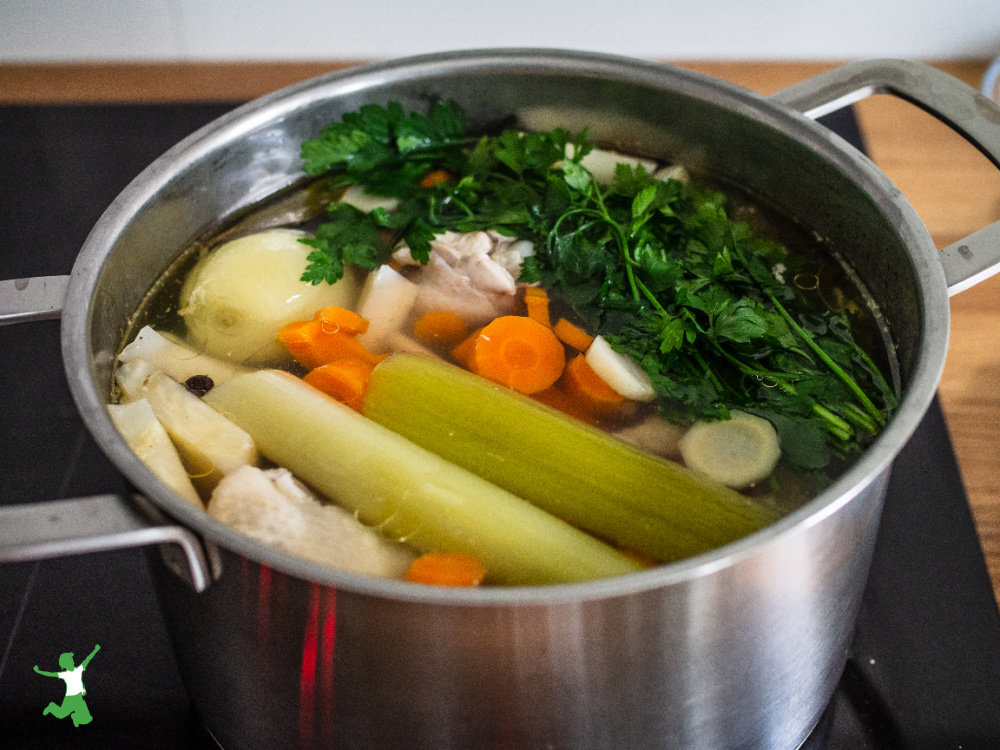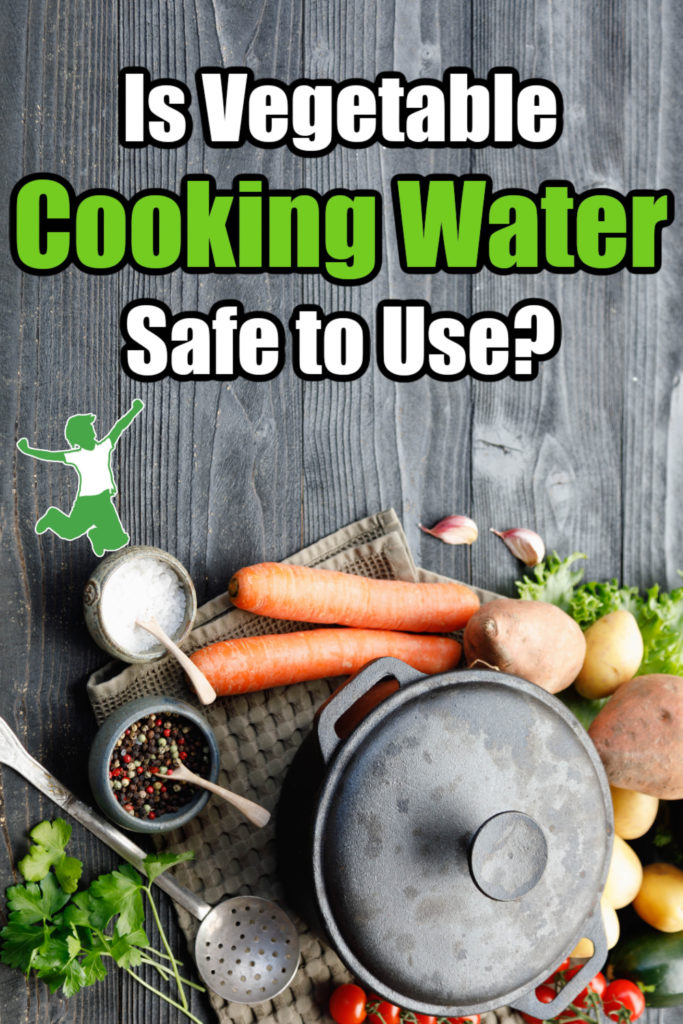Guidelines for when vegetable cooking water is safe to use and when it is best to toss due to nitrites, residues or anti-nutrients that can do more harm than good.

Adelle Davis popularized the practice of saving vegetable cooking water during the Leave it To Beaver era of the American 1950s.
She reasoned that any vitamins and minerals lost from cooking the vegetables would end up in the water.
This supposedly nutrient-rich cooking water could then be added to homemade soups or sauces with the nutrition benefiting those that consumed them.
This notion took hold and has not let go to this day.
Unfortunately, reserving vegetable cooking water can do more harm than good.
Consider the reasons below before you use it in your dishes. How to know your veggie cooking water is safe is discussed as well.
Chemical Residues
If the vegetables that are cooked are not organic, pesticides and nitrites from commercially produced fertilizers can end up in the cooking water.
Even low to no spray veggies such as asparagus would not be safe.
These crops are still typically fertilized with commercial preparations that are high in nitrites.
Anti-Nutrients
Cooking cruciferous vegetables such as broccoli, cauliflower, cabbage, Brussels sprouts, and kale would add goitrogenic (thyroid blocking) substances to the cooking water which should be discarded.
Water used to boil potatoes would contain chemicals called hemagglutinins that disrupt red blood cell formation.
Dark green, leafy vegetables such as beet greens, raw spinach, and chard contain oxalic acid that blocks calcium and iron absorption.
This irritating substance also can cause distress to the sensitive mucous membranes in the mouth and intestinal tract and contributes to the formation of kidney stones.
Consuming raw crucifers or dark, leafy greens is not an alternative either as the substances that cause problems when in the cooking water also cause problems if consumed directly with the vegetable in an uncooked state such as a raw green smoothie.
Legumes & Beans
For the last few years, the vegan community has popularized the trend of reusing legume cooking water, particularly from chickpeas.
This isn’t a safe practice even if the legumes or beans are soaked before cooking.
This soapy, slimy water is called aquafaba and is used as an egg replacement, particularly in dessert recipes. It whips up foamy just like egg whites.
Published research reveals that chickpea cooking water contains saponins, a potent anti-nutrient that contributes to leaky gut, which is at epidemic levels today.
It is also not advisable for pregnant women to consume this substance as it is a miscarriage risk.
Safe Vegetable Cooking Water
Do you really want to use vegetable cooking water as a frugal tool in your kitchen routine?
Consider this list of some of the most popular vegetables below. They are safe to use for that purpose.
- carrots
- turnips
- potatoes (peelings)
- parsnips
- beets
- celery
- organic pumpkins and squash (including zucchini)
- organic onions, leeks, and garlic
- nightshades (tomatoes, eggplant, and peppers among a few others)
For example, this potassium broth recipe uses vegetables simmered in water from the list above.
Simple Guidelines To Follow
Do you find it confusing to remember the distinctions between which organic veggies are safe to use and which are not?
Or, do you buy some veggies organic and others conventional?
If so, it is best to just adopt the practice of not using the cooking water at all.
This is particularly true if you tend to mix veggies together when cooking them.
Never Use Veggie Water for Baby Food
It is of particular importance NOT to use vegetable cooking water for use in pureeing homemade baby food.
Use pure filtered water instead, or if baby is old enough, some homemade bone broth or meat stock.
Final Caution to Consider
One final word of caution.
All vegetables tend to form nitrates after cooking and during storage. These nitrates can transform into strong carcinogens in the intestines.
Hence, it is best to avoid refrigerating and reheating vegetables, particularly leafy, green vegetables which concentrate nitrates when grown commercially.
References
Nourishing Traditions Cookbook








I see that Boiling Potatoes isn’t just have nothing good for healthy, it also removes its natural flavor so it is best to steam them rather than to boil them.
What would be said of water used to blanch fruits. May one drink this?
We pressure cook them. Saves time and fuel
So I guess no more veggie soup
Why don’t you use chicken bone broth as a base for your veggie soup? Much tastier too!
I boil onions and cabbage, drink the juice instead of throwing it away, Gout free for 10 years, before that I was on medication to lower uric acid, I was able to stop the medication 10 years ago, don’t believe everything you read on a website.
They’re probably trying to sell you something, I’m not.
Hello again Sarah!
I found a research by EFSA called “Nitrate in vegetables Scientific Opinion of the Panel on Contaminants in the Food chain”. They say “Nitrite accumulation is inhibited under frozen storage (Phillips, 1968). Schuster and Lee found no significant changes in nitrate or nitrite content of spinach, beet, carrot, parsley-root, celery or potatoes during frozen storage for up to 12 weeks, (Schuster and Lee, 1987).”
Also I’ve found that chard and spinach are better cooked than raw in many aspects. So from now on, i’m going to boil those greens, discard the water, and then freeze them for using them later in my green drinks.
First of all, thank you very much for this information, it’s really really helpfull.
I was looking for information, because recently I cooked stems of chard for my vegetable shake and saved the water as well (which I’m going to throw after reading this), I tried to use raw chard, but I really dislike its taste.
Now I’ve frozen these cooked stems to use them later, and you said that stored tends to form nitrates, which is bad, but maybe frozen is different.
Is it a bad practice? If it is, what would you recommend?
I’ve not seen any research on nitrates in frozen cooked veggies. But to be on the safe side, perhaps freeze them before cooking instead?
What about using the cooked veggie water to water outside plants and vegenables still growing
Thank you, Sarah. Your article does make sense actually. Following your suggestions has helped me eat healthier and avoid gastro symptoms such as bloating. I’m not sure if you’ve covered this elsewhere, but could you also advise on the healthiest way to cook kale? Thank you.
Should be in the linked article about raw veggies 🙂
What about grains or chickpeas after soaking overnight?
You definitely cannot use the soaking water of grains or chickpeas for cooking. The water would be loaded with anti-nutrients.
are you kidding me? duh…that’s why you should ONLY EAT ORGANIC FOOD. HELLO. my god how dumb are all of you?